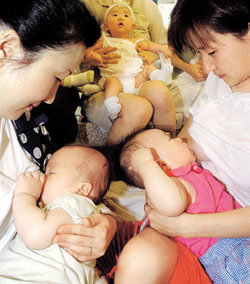Breast-Feeding: The More You Know, the Better You Feed
Breast-Feeding: The More You Know, the Better You Feed
Posted June. 27, 2004 22:32,

When should one prepare for breast-feeding? Many mothers think: I will start breast-feeding after I giver birth and begin lactating. However, this is incorrect.
Experts point out that breast-feeding is likely to fail if not prepared before pregnancy. They say that breast-feeding is not possible through instinct but rather, education.
In addition, the success of breast-feeding depends on the first and second week after delivery, hence the will and environment of the mother is most important.
Some essential information to know for successful breast-feeding:
--Breast-feeding is education
If you are pregnant and decide to breast-feed, you need to know as much as possible by either reading books or watching videos. Nowadays, almost all hospitals have pre-delivery breast-feeding education programs, so joining one of the programs is also recommended. It is also important to check if the hospital where you plan to give birth has a maternal room and breast-feeding delivery room.
Furthermore, clearly state to your doctor before childbirth that you want to breast-feed, and request to breast-feed your baby somewhere between 30 minutes to an hour after birth. That is because the doctor might advise against breast-feeding in case the mother is too tired after delivery.
When you go to give birth, pack a notebook and pen or pencil, so you can record the babys time and frequency for breast-feeding and number of times the baby excretes. You should also prepare in advance a breast-feeding cushion, brassiere, dress, and pad. The phone numbers of friends and relatives who you can ask for advice on breast-feeding, and books that you can consult in case of problems should also be collected.
--For Newborns, Breast Milk is a Medicine
If possible, one should try to breast-feed within an hour after birth. It is easy to breast-feed a newborn because they are not asleep and are quite awake. When the babies suckle, lactation slowly increases and the womb slowly contracts, decreasing post-birth complications such as bleeding. Breast milk that does not come out well in the beginning will start to come out better three to five days after birth. For better breast-feeding, it is necessary to make the baby suckle both breasts for 15 minutes each, eight to 12 times per day. In case of caesarian operations, it is better to have an epidural anesthesia rather than total anesthesia, so you can breast-feed right after birth.
--Breast-feeding, Nothing is impossible
Some mothers think that they should avoid breast-feeding if they have hepatitis, or if they deliver premature babies. In reality, however, less than 5 percent of mothers have difficulties in breast-feeding.
Breast milk is rich in fats, proteins and minerals necessary for premature babies, so it is beneficial to breast-feed premature babies. At the same time, it is also advised to feed powdered milk specially produced for premature babies. On the other hand, hepatitis is not transmitted through breast-feeding. If the mother catches a cold, her level of antibodies will increase, benefiting the baby.
Nevertheless, if the mother is undergoing chemotherapy or radioactive therapy, or the baby has galactosemia, a condition in which the baby cannot digest lactose, breast-feeding is not possible.
Many mothers give up breast-feeding because of inverted nipples. In many cases, however, inverted nipples are naturally corrected when the breast grows during pregnancy. In addition, it is not impossible to breast-feed because of inverted nipples.
The Hoffman technique--pulling the nipples to correct inverted nipples---and other methods to stimulate nipples before delivery should be avoided because they might cause premature birth; they should be attempted after delivery. In most cases, breast-feeding is possible by slightly pressing the areola and extending the nipple before presenting it to the baby.
(Written with the help of the Korean Association of Pediatric Practitioners Breast-Feeding Committee--Chung Yoo-mi, Expert Pediatrician.)
Jin-Han Lee likeday@donga.com







